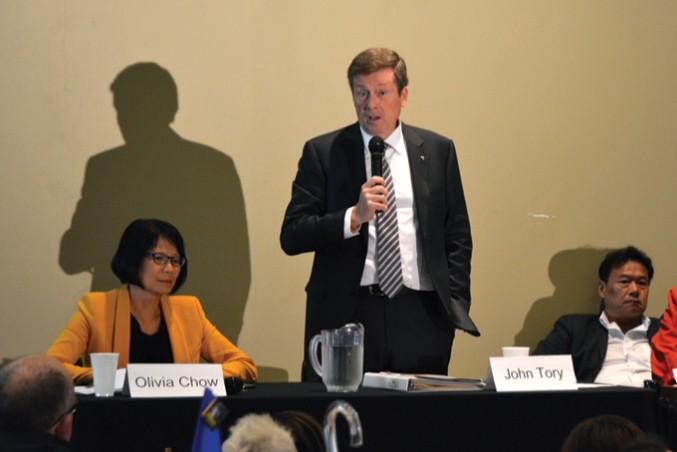By Alex Downham
Olivia Chow duked it out with John Tory Monday in a debate at Ryerson on disability issues — the second meeting of the two candidates on campus.
Chow and Tory spoke at Tecumseh Auditorium in the Student Campus Centre. Doug Ford, the newest candidate in the race, did not attend. Throughout the debate, the two candidates discussed unemployment, poverty and obstacles disabled citizens face.
“The best way to lift people out of poverty is steady employment,” Tory said.
Chow agreed and said Toronto needs to employ more workers with disabilities. “A report card should be written on Toronto helping, training and hiring disabled citizens,” Chow said.
Some attendees said they couldn’t work long hours due to their disabilities.
“People with different physical and mental capacities may not be able to work eight hours, but there’s more part-time employment opportunities available,” Tory said.
Heather Willis, co-chair of Ryerson’s Accessibility Advisory Committee, said solving disability issues is a complex process, but added that transit accessibility is crucial.
“Without reliable, accessible transit, people with disabilities cannot work,” Willis said. She said winter is a particularly difficult time for physically disabled people to travel in.
Wheel-Trans buses are the primary mode of public transportation for Torontonians with disabilities.
The program, which Tory called unreliable, had 31,225 active registrants in 2013.
“It’s unacceptable when Wheel Trans doesn’t answer phone calls of citizens waiting for late buses,” Tory said.
Chow proposed to invest $225 million toward transit accessibility on buses and light rail transit and cited the new 510 Spadina streetcars as proof of an increase in accessible transit.
“The [street]car works because it was designed by people in wheelchairs,” Chow said. The vehicle has low floors and an extendable ramp.
Chow jabbed at Tory’s support for a three-stop extension of the Scarborough subway. Chow said $1 billion invested into the project was money from Easier Access, a TTC initiative aimed to make all transit accessible by 2025.
However, Brad Ross, TTC executive director of corporate communications, told The Eyeopener that the funding for Easier Access is unrelated to the subway extension’s.
“The Scarborough subway is not part of the TTC budget,” he added.
Tory responded saying it was “ridiculous” to say that funding for Easier Access was put into the Scarborough subway.
Chow continued her criticism, calling Tory’s subway plans “unnecessary” and “postponed.”
“My investment doesn’t leave anyone behind,” Chow said, stating only half of Toronto’s subway stations are accessible.
Tory’s alternative, which he defended as a “good, long-term investment,” is to build 22 accessible “surface subway” stations along previous GO Train lines. That system wouldn’t open for seven years.
No matter the transit, Willis said more accessible spaces means more independence for disabled citizens.
“No matter how accessible public transit is, there will always be a need for individual accommodation,” Willis said. “Without it, getting to work — or anywhere — will be difficult.










Leave a Reply